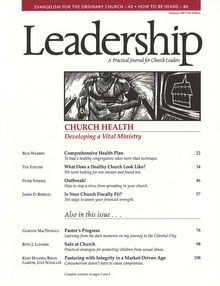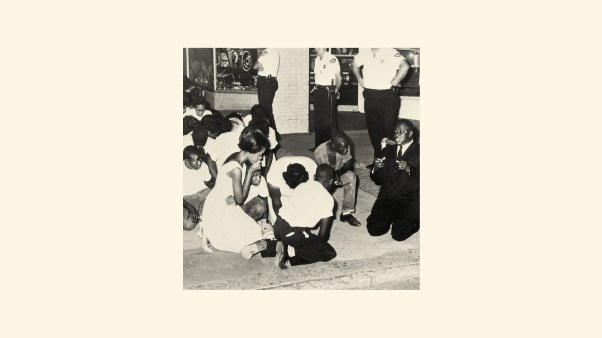We all know the blessings of being in pastoral ministry—the blessing of knowing that your life is spent for the gospel, using your gifts, meeting wonderful people, receiving people’s encouragement, and seeing changed lives.
We can’t achieve these things, though, without paying a price.
In John 12, Jesus said, “Unless a grain of wheat falls to the earth and dies, it stands alone. But if it dies, it produces many seeds.” The “Law of the Harvest” is simply this: If we want to be productive for Jesus, there will be pain and dying.
I have learned there are specific costs to being a leader. Here are five prices of pastoral leadership.
The price of people’s projections
Because church leaders are in positions of authority, some people will project onto us negative feelings from authority figures in their past. One of my friends calls it “being presented with another person’s bill.”
Rita sat down in my office. We’d had only a few superficial conversations before, ones I considered friendly.
“So, what can I do for you?” I asked as she shifted in her chair.
“I knew I would be nervous,” Rita replied, “so I decided to write all my thoughts down in a letter.”
She handed me her epistle—about six pages, single-spaced— detailing how I was just like her ex-husband. I did not want her to have a career; I did not believe she was smart; and I was critical of her ministry ambitions.
After about ten minutes of speed-reading the letter, I put it on the coffee table between us, sat back, and said nothing.
After a couple of awkward minutes of silence, Rita finally asked, “What do you think about what I wrote?”
What I thought was, I not only have no negative thoughts about you, I never think about you at all.
Selfish ambition focuses on a role. Godly ambition focuses on a need.
What I said was, as gently as I could, “Rita, I believe you have never forgiven your ex-husband.”
She burst into tears. We then talked about some of the things she had suffered at the hands of significant men in her past. We prayed together, and Rita left.
To remain sane, we need to realize that often leaders are asked to pay bills that are not theirs. When someone says, “We have an issue between us,” I occasionally say, “No. We do not have a problem. I have no problem with you. What is the issue you have with me?”
The price of being a lightning rod
Bill was a faithful worship team member. When a position for a new worship leader opened up, Bill thought he would get the nod. But for a number of reasons, the position was given to Gina. Though I had nothing to do with this decision, Bill became angry with me.
As leaders, we may become lightning rods for people’s pain.
There are several ways to lower the likelihood of being a lightning rod for difficult decisions. One is to teach the difference between godly ambition and selfish ambition. I teach that selfish ambition focuses on a role—Sunday school coordinator, worship leader, paid ministry position. Godly ambition focuses on a need—the need for children to be taught the Bible, the need for people to pray, or the need for lost people to know the Savior.
I asked one man, “If you are denied this position as a youth pastor, can you find another way to minister to teens? If your heart is set on meeting needs, and not on a particular role, then you are secure.” This kind of teaching helps reduce the number of lightning strikes.
Another way to lessen the lightning-rod syndrome is to minister with a team. While a senior leader must be involved in difficult decisions, the senior leader must also insist that the responsibility for hard decisions does not always get passed to his or her desk.
I tell our staff members that when they deliver bad news, they must not shift the blame to me just to avoid confrontation. If they don’t agree with the call, they can tell me in my office. But once we’ve agreed on the decision, they must take the heat just as I will. Being a lightning rod is a price of leadership.
The price of displeasing people
Our church lost its largest donor because someone confronted him about his speech patterns. After I recovered from the shock of losing him, God spoke to me in a still, small voice: Are you really upset? Shouldn’t he have been confronted about his speech?
Absolutely, Lord, I prayed. But could you bring someone else who will give what he gave?
If we live to please people, we become slaves of our people. Instead of one master (Jesus, whose yoke is easy), we end up with numerous Pharaohs who are never satisfied with our performance no matter how much we do. My willingness to displease people has actually gained me respect. For example, I’ve had staff members tell me they were upset because they got overly positive evaluations from supervisors. They didn’t receive honest feedback or the supervision they needed to help them grow.
People of good character do not want to be flattered or lied to. They want to hear the truth, as long as they feel loved and pastored in the process.
Leaders must be willing to pay the price of displeasing people.
The price of unrealistic expectations
Bill and Janette repeatedly invited my wife, Marlene, and me for dinner. Marlene kept having to say things like, “We’ll have to check our schedules,” “Rich is going to be out of town that week,” or “We have a conference that weekend.” Bill and Janette’s frustration level grew.
I don’t like it, but the size of our church makes it unrealistic for us to become close friends, or even have dinner, with a large percentage of our church members.
Unrealistic expectations come not only from others; some are self-imposed. I can think, You are not meeting with enough people! You need to be mentoring more young leaders! You need to be praying more! Things would be going better if you spent more time studying the Word!
Note the contrast between these two accounts of Elijah. James 5:17 reads, “Elijah was a man just like us. He prayed earnestly that it would not rain and it did not rain on the land for three and a half years. Again he prayed and the heavens gave rain and the earth produced its crops.”
But 1 Kings 18:4 says, “Elijah came to a broom tree and sat down under it and prayed that he might die.”
I can identify with the great prayers of Elijah as well as his desire to pack it in. One reason I sit under the broom tree is the unrealistic expectation that I should function at one of three speeds: fast, faster, and supersonic.
Leaders will face unrealistic expectations, both others’ and our own.
The price of fatigue
A few years ago, I returned from two weeks of conferences, during which I taught many times. I immediately went to work and actually wondered, Why am I feeling exhausted and depressed?
Psychologist Archibald Hart has written that people can become addicted to the high of adrenaline. He explains that leaders often experience post-adrenaline depression after heavy ministry or relational demand. That’s why pastors often feel depression on Monday after preaching on Sunday.
I’ve come to accept that, following a conference or weekend of ministry, I will be subject to spiritual attack and feelings of depression. I try to give myself more time to be away from people. I no longer feel I have to burn the fumes in my empty gas tank.
Several years ago, I sat down with a blank sheet of paper and prayed, “Lord, I really need to get in touch with my emotional energy level. What are the things that fuel my engine? And what are the things that drain it?”
I wrote, for example, that I am particularly fueled by evangelism, so each fall and spring, I do open air-preaching at Ohio State University. On the other hand, if I feel trapped in my office pushing paper, my battery gets drained.
Leaders must pay the price of fatigue, yet also learn how to prevent it.
For ministry to go forward, some people must be willing to say, “I am willing to have people present me with bills that are not mine. I am willing to make tough calls in ministry. I am willing to be poorly thought of by some people. I am willing to give up my house and my relationships to go across the world to bring this message. I will pay the price of pastoral leadership.”
Rich Nathan is pastor of Vineyard Christian Fellowship in Columbus, Ohio.
1997 by the author or Christianity Today/Leadership Journal. For reprint information call 630-260-6200 or contact us.









